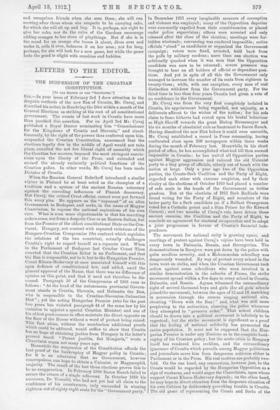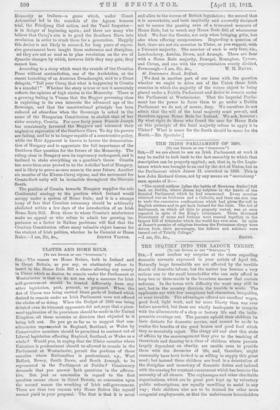despotic methods of the new Ban of Croatia, Mr. Cuvaj,
and Mr. Cuvaj was from the very first completely isolated in described his action in dissolving the Diet within a month of the Croatia, his appointment being regarded, not unjustly, as a General Elections as striking at the root of all constitutional deliberate affront to the wishes of the nation; for his sole government. The events of last week in Croatia have more claim to fame hitherto had rested upon his brutal behaviour than justified this assertion. For on April 3rd Mr. Cuvaj as High Sheriff towards the great Bishop Strosamayer and published a Royal Decree nominating him " Commissioner his six months of absolutist rule as lieutenant to Baron Rauch. for the Kingdoms of Croatia and Slavonia," and simul- Having dissolved the new Diet before it could even assemble. taneously, by the right of the powers thus conferred upon him, Mr. Cuvaj established a record in Press censorship, baring suspended the Croatian Constitution, announced that the confiscated close upon 200 newspapers within three weeks elections legally due in the middle of April would not take during the month of February last. Meanwhile, in his short place, annulled the not too liberal right of assembly which period of office, he has aocomplished what had till then seemed the Croatian law assures, imposed the most stringent restric- impossible in Croatia: he has united all Opposition parties Lions upon the liberty of the Press, and extended and against Magyar aggression and reduced the old Unionist revised the already eminently political functions of the party to a tiny group of officials, utterly out of touch with the Croatian police. In other words, Mr. Cuvaj has been made nation at large. Only a year ago two of the Opposition
Dictator of Croatia. parties, the Croato-Serb Coalition and the Party of Right,
When the Russian General Bobrikoff introduced a similar regarded each other with extreme suspicion, and by their te7gime in Finland he at least acted as the champion of a rivalry at the elections of October 1910 had placed a number tradition and a system of the ancient Russian autocracy of safe seats in the hands of the Government as tortilla against the corroding influences of Finnish democracy. gaudens. But at the elections of 1911 Serb Radicals were But Cuvaj, the retired Croat official, cannot even put forward found voting for the Party of Right, and members of the this sorry plea. He appears as the " exponent " of an alien latter party for a Serb candidate (as if a Belfast Orangeman Government in Budapest, and seeks, in the name of Magyar voted for a Catholic priest and a Sinn Feiner for Sir Edward Chauvinism, to repress the national aspirations of his own Carson) ; and two months of Ouvaj's rule have driven those race. What is even more objectionable is that his marching ancient enemies, the Coalition and the Party of Right, to orders come, not from a despotic Czar or an Eastern Sultan, but conclude an agreement for electoral co-operation and to adopt from the Premier of the oldest constitutional State on the Con- a joint programme in favour of Croatia's financial inde- tinent. Hungary, not content with repeated violations of the pendence.
Government, o m arbitrarily quashed when it was seen that the Opposition candidate was sure to be returned ; severe pressure was LETTERS TO THE EDITOR. brought to bear on all holders of official or dependent.poei- ...■.■■•■ tions. And yet in spite of all this the Government only
THE SUSPENSION OF THE CROATIAN managed to increase the number of its seats from eighteen to twenty-three ; while, with ono exception, every man of real CONSTITUTION. distinction withdrew from the Government party. For the
Hungaro-Croatian Compromise (the contract which regulates The movement for national unity is growing apace, and the relations of the two countries), actually challenges meetings of protest against Ouvaj's regime have been held in Croatia's right to regard herself as a separate unit. When every town in Dalmatia, Bosnia, and Herzegovina. The in the Parliament of Budapest last October Count Tisza demonstrations in Sarajevo were put down by the police with asserted that the Croatian Sabor is no Parliament, and that quite needless severity, and a Mohammedan schoolboy was the Ban is responsible, not to it, but to the Hungarian Premier, dangerously wounded. By way of protest every school in the Count IChuen-Hedervary at once associated himself with this town went on strike, and when the Croatian Government took open defiance of constitutional law, and added, amid the action against some schoolboys who were involved in a general approval of the House, that there was no difference of similar demonstration in the suburbs of Fiume, the strike opinion on this point, and that it need not therefore he die- movement spread within a few days to every school in Croatia, cussed. Paragraph 50 of the Compromise of 1868 runs as Dalmatia, and Bosnia. Agrain witnessed the extraordinary follows : "At the head of the autonomous provincial Govern- sight of several thousand boys and girls (for all girls' schools silent stands in Croatia, Slavonia, and Dalmatia the Ban, joined the movement), between the ages of 12 and 19, marching who is responsible to the Croatian-Slavonian-Dalmatian in procession through the streets singing national airs, Diet " ; yet the acting Hungarian Premier (who for the past shouting "Down with the Ban 1 " and, what was still more • two years has violated paragraph 44 of the same law by his perplexing to the authorities, cheering the police whenever omission to appoint a special Croatian Minister) and one of they attempted to " preserve order." That school children his ablest predecessors in office maintain the direct opposite on should be drawn into a political movement is infinitely to be the floor of the House without a word of protest being raised. regretted ; but the strike movement is significant as a proof This fact alone, without the numberless additional proofs that the feeling of national solidarity has permeated the which could be adduced, would suffice to show that Croatia entire population. It must not be supposed that the Hun- tts no hope of obtaining justice from Hungary in the latter's garian Premier is under any illusions as to the complete bank- present mood. "Pereat justitia, fiat Hungaria," wrote a rupee), of his Croatian policy; but the acute crisis in Hungary Chauvinist organ not
many years ago. itself has rendered him reckless, and the extraordinary
Meanwhile the suspension of the Constitution affords the ignorance of Croatia which prevails among Magyar politicians best proof of the bankruptcy of Magyar policy in Croatia ; and journalists saves him from dangerous criticism either in for it is an admission that no ernment, however Parliament or in the Press. His real motives are probably two- unscrupulous, can hope to obtain a Unionist or Magyarophil, fold. On the one hand, any concessions, however just, to the majority. The resalt of the last three elections proves this to Croats would be regarded by the Hungarian Opposition as a be no exaggeration. In February 1908 Baron Ranch failed to sign of weakness, and would anger the Chauvinists, upon whose secure the return of a single adherent. In October 1910 his support Count Klmen-Hedervary depends ; on the other hand. successor, Dr. Tomaeie, who had not yet lost all claim to the he may hope to divert attention from the desperate situation of confidence of his countrymen, only succeeded in winning his own Cabinet by deliberately provoking trouble in Croatia. eighteen out of eighty-eight seats for the " Government party." The old game of representing the Croats and Serbs of the
Monarchy as traitors—a game which, under Count Aehrentlial led to the scandals of the Agram treason trial, the Friedjung libel action, and the Vasiei forgeries— is in danger of beginning again ; and there are ninny who believe that Cuvaj's aim is to goad the Southern Slays into revolution in order to crush them for a generation. Happily this device is not likely to succeed, for long years of repres- sive government have taught them endurance and discipline, aid they are not so mad as to plan revolution on the eve of dynastic changes by which, however little they may gain, they cannot lose.
According to a story which went the rounds of the Croatian Press without contradiction, one of the Archdukes, at the recent launching of an Austrian Dreadnought, said to a Croat delegate, "Tell your Cuva,j that what is happening in Croatia is a scandal I" Whether the story is true or not it accurately reflects the opinion of high circles in the Monarchy. There is a growing feeling in Vienna that the Magyar governing class is exploiting in its own interests the advanced age of the Sovereign, and that the constitutional principle has been reduced ad absurdum, when the Sovereign is asked in the name of the Hungarian Constitution to abolish that of her sister country, Croatia. For over forty years Francis Joseph has consistently favoured the Magyars and tolerated their neglect or repression of the Southern Slays. To-day his powers are failing, and he is no longer capable of a constructive policy, while the Heir Apparent is known to favour the democratiza- tion of Hungary and to appreciate the full importance of the Southern Slav question for the future of the Monarchy. The ruling class in Hungary sees its supremacy endangered, and is inclined to stake everything on a gambler's throw. Croatia has more than once proved to be the Achilles' heel of Hungary, and is likely to prove so once more in the near future. Another six months of the Khuen-Cuvaj regime, and the movement for Croato-Serb unity will be invincible throughout the Slavonic South.
The position of Croatia towards Hungary supplies the sole Continental analogy to the position which Ireland would occupy under a system of Home Rule ; and it is a strange irony of fate that Croatian autonomy should be arbitrarily abolished within a few days of the introduction of an Irish Home Rule Bill. Even those to whom Croatia's misfortunes make no appeal or who refuse to admit her growing im- portance us a factor in Balkan problems will find that the Croatian Constitution offers many valuable object lessons for the student of Irish politics, whether be be Unionist or Home







































 Previous page
Previous page